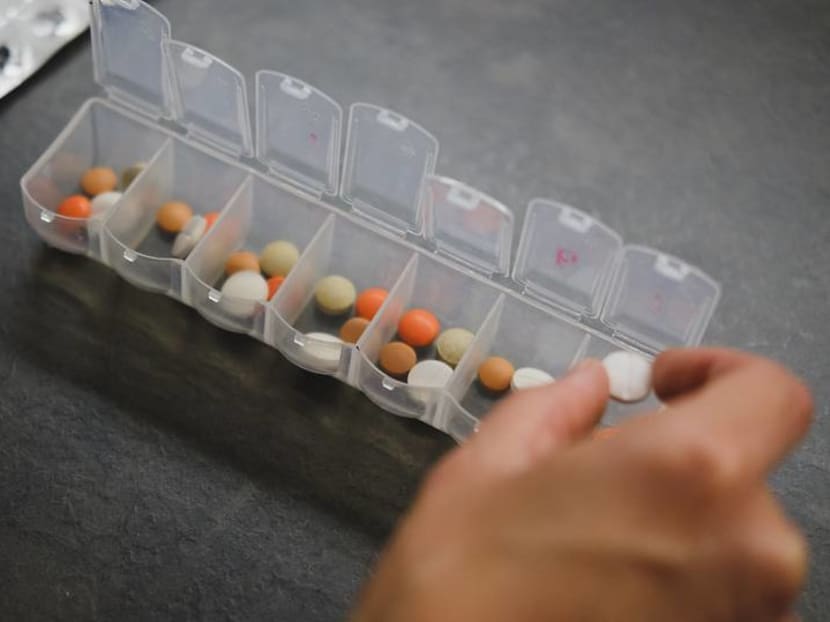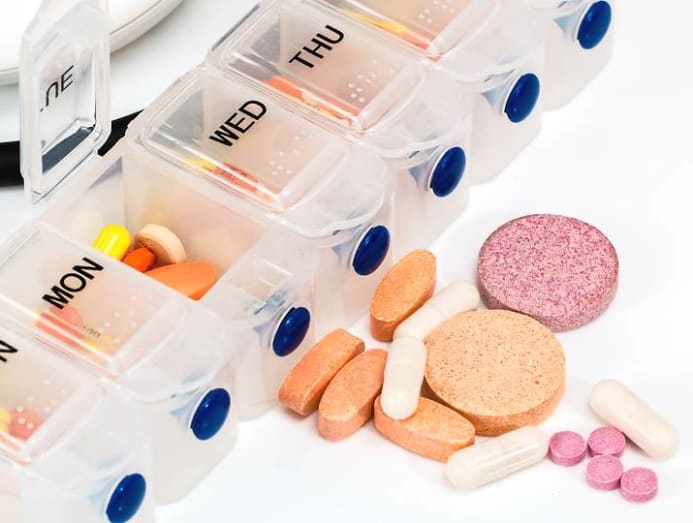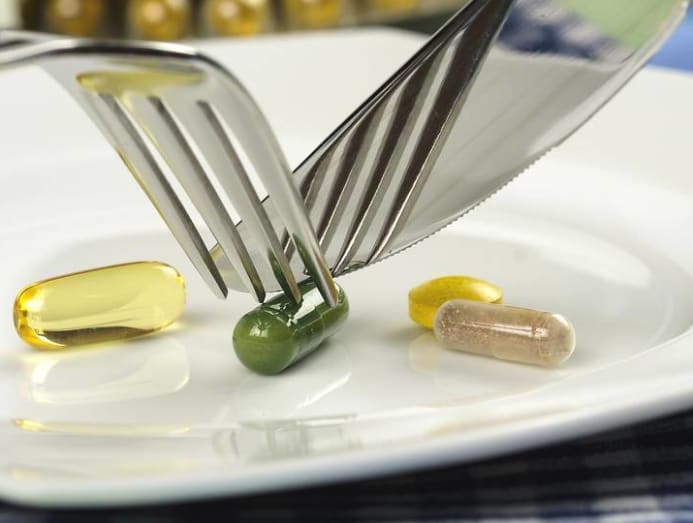Too much Vitamin C can cause kidney stones – are you popping supplements safely?
Nutrition experts tell CNA Lifestyle why multivitamins aren't always your best bet – and which common notions about health supplements are actually false.

(Photo: Unsplash/Laurynas Mereckas)
Not every Singaporean would consider himself or herself a hypochondriac but it does seem that a lot of us love our vitamins and supplements.
That’s probably because there seems to be a pill available for everything – from boosting memory (gingko biloba) and easing aching joints (glucosamine and collagen) to improving heart function (omega-3 fatty acids) and blood pressure levels (co-enzyme Q10) to aiding digestion (probiotics) and supporting pregnancy (folic acid).
Take, for instance, that cold you think is coming on. You might reach for a Vitamin C or zinc tablet for an immunity boost. Busy individuals may also pop multivitamins in an attempt to fill nutritional gaps in their diets.
But do you really need these supplements? According to Yeo Qi Mei, a dietitian with Tan Tock Seng Hospital’s Department of Nutrition and Dietetics, our nutritional requirements should ideally come from a varied and balanced diet made up of whole foods – which could be a “cheaper and tasteful alternative”.
Having said that, Yeo added that there are situations when these “health in a bottle” solutions may be handy.
She cited, as examples, “elevated nutritional needs during pregnancy, Vitamin D supplementation for the elderly, vegetarians at risk of iron deficiency”, or individuals who have had stomach or small intestine surgery, and require “specific or multivitamin supplementations”, she said.
MORE SINGAPOREANS ARE BUYING SUPPLEMENTS
People consume supplements primarily as a way to safeguard against the effects of poor eating habits, inactivity and stress. And Singaporeans take a lot of these – last year, about S$594 million were spent on health supplements, according to the Health Supplements Industry Association of Singapore (HSIAS) in a TODAY article.

It’s a number that’s been steadily rising. According to market research firm Euromonitor, we bought US$374.4 million (S$517 million) worth of supplements in 2017, which is already a huge increase from the US$344 million spent in 2012.
The figure is expected to increase 8 to 10 per cent annually, said HSIAS’ president, Daniel Quek, who added that multivitamins, calcium and Vitamin C pills are among the most popular supplements sold here.
One factor that contributes to the popularity of supplements is that they’re readily available. They don’t even have to be approved or licensed by the Health Sciences Authority (HSA) before they hit the shelves (even though it does monitor the local market). You can, for instance, buy fish oil or probiotic capsules directly at pharmacies and supermarkets without any prescription.
READ: Is brunch making you fat? This pancake could be 300 calories without toppings
HOW TO TAKE SUPPLEMENTS CORRECTLY
If you find your medicine cabinet filled with bottles you’ve lost track of, it may be time to review your supplementary routine. CNA Lifestyle spoke to the nutrition experts, who addressed some common – but inaccurately held – notions about taking supplements.
FALLACY #1: WHEN IN DOUBT, JUST GO FOR MULTIVITAMINS TO COVER ALL GROUNDS
We hate to break it to you but you may be better off eating proper meals instead. “Multivitamins usually contain small amounts of vitamins and nutritional elements, but these can usually be obtained from a healthy diet,” said Zoe Kong, principal pharmacist with the Department of Pharmacy at National University Hospital.

Moreover, supplements are "necessary only when one has a proven medical deficiency from blood test results", said Patsy Soh, a dietitian with Mindful Nutrition. "Or individuals who are lactose intolerant and can't take dairy products can benefit from a calcium pill."
Furthermore, there can be serious implications from taking multivitamins, said Kong. “Taking multivitamins can be dangerous if you’re on certain prescription drugs such as the blood-thinning warfarin as multivitamins with a high Vitamin K content can block the effect of the drug,” she said.
“Patients taking certain medications such as isotreinoin and acitretin, or who are pregnant, should also avoid taking multivitamins containing Vitamin A without consulting their healthcare provider.”
READ: Are eggs the cholesterol bombs that experts make them out to be?
FALLACY #2: YOU THINK YOU’RE NOT GETTING ENOUGH NUTRIENTS FROM YOUR FOOD
You may eat out a lot but most of us aren't in that much trouble nutritionally, unless you belong to these categories. For instance, iron deficiency is the most common in pregnant women, said Kong. She also sees a lack of calcium and Vitamin D in the elderly – not a good sign as they need those nutrients to build strong bones and avoid osteoporosis.
Vitamin D deficiency is another example. Interestingly, Singaporean women are at risk of not getting enough of this vitamin, not because of their diet, but their skincare routine, said Yeo, citing a Ministry of Health report released in November 2018, which indicated that 40 per cent of Singaporeans lacked the vitamin. “It is due to the increased use of sunscreen that lowered the amount of Vitamin D synthesised by the body from sunlight,” she said.

When it comes to Vitamin B12 deficiency, it is usually vegans and patients with “certain inflammatory bowel disease” who are likely to develop it, “due to their restricted dietary intake,” said Kong. “Vitamin B12 is needed for everyone to make new red blood cells and for our nervous system to function optimally.”
But before you rush out to grab some vitamins, look at the food in your kitchen first. Many items are already fortified with vitamins and minerals, such as the calcium-enriched orange juice and the omega-3-fortified eggs in your fridge. To avoid overdosing on vitamins and minerals, pay attention to the food labels, said registered dietitian Chris Rosenbloom, who is a professor of nutrition at Georgia State University in Atlanta.
"When you're grocery shopping, picking up an energy bar or breakfast cereal, look at the supplement facts panel. If you see 100 per cent of the recommended dietary allowance (RDA), you may not need a multivitamin supplement,” she said.
READ: Real weight control is all about portion control, not fad diets
FALLACY #3: IT’S BETTER TO TAKE MORE VITAMINS AND MINERALS THAN TOO LITTLE. YOUR BODY WILL PASS OUT THE EXCESS ANYWAY
Vitamin C tends to fall into this category of over-enthusiastic use. "Most people think it's fine to take as much Vitamin C as they want," said Prof Rosenbloom. "I know people who take 10,000mg a day" when the upper tolerable limit is 2,000mg a day, she said.
There are repercussions for doing so. "Excessively large amounts of Vitamin C have been occasionally linked to hyperoxaluria, a condition where there is too much oxalate in the urine,” said Kong. “The excess oxalate can combine with calcium to form crystals and possibly, kidney stones. Otherwise, the most common side effects reported include diarrhoea, nausea and vomiting.”
Kong also warned against an excessive calcium intake. “It can harm the kidneys and reduce absorption of other essential minerals like magnesium and iron,” she said, adding that fat-soluble vitamins such as A, D, E, and K are stored longer in the fatty tissues and the liver, and can lead to increased risks of toxicity if consumed excessively.
If you’re not sure what the maximum safe limits of the vitamins and minerals are, check here.
FALLACY #4: IT'S OK TO TAKE THOSE JUST-EXPIRED GLUCOSAMINE TABLETS
Some supplements aren’t cheap but it’s still best to discard them once the expiry date is past. “As supplements may lose their effectiveness over time, the expiry date indicates the period of effectiveness of the supplement,” said Vanessa Png, senior pharmacist at Raffles Health.
Keeping to the expiry date isn’t the only thing to ensure your vitamins’ effectiveness. Png advised to keep them in a cool and dry place, or refrigerated once opened.
“Storing in certain conditions such as in a car under the hot sun, or in damp bathroom cabinets may cause the heat and moisture to reduce the effectiveness of the supplements,” she said.

Soh noted that the amount of vitamin or mineral in the supplement is "questionable" in the first place. "Manufacturers typically put 'too much' into the pills, so that towards the end of their shelf lives, they still contain roughly what is stated on the label," she said.
Since no one can tell the supplement's rate of degradation over time, there's no telling the amount of nutrients in each pill. "It's like playing Russian roulette," she said.
FALLACY #5: IT'S OK TO TAKE YOUR SUPPLEMENTS ALL IN ONE GO
Now, hold on a minute before you empty a fist-full of pills into your mouth like popcorn. While it’s true that some vitamins and minerals are better taken together (such as Vitamin D and calcium; and Vitamin C and iron) as they enhance the body’s absorption, some aren’t great together. You’ll want to avoid iron and calcium, magnesium and calcium, and iodine and selenium combinations, said Yeo.
“To maximise the absorption of the vitamin or mineral, it is recommended to take the supplements as directed by your doctor or pharmacist, or as instructed on the product’s package,” said Yeo. “For instance, taking calcium supplements at least two hours away from iron supplements may improve bioavailability of the minerals that can be absorbed in our gut.”
As for taking supplements with food, Vitamins A, D, E, and K are certainly good pals at mealtimes, said Kong. “As fat-soluble vitamins, they are thought to be better absorbed through the intestine in the presence of some dietary fats.” Calcium, especially those in the form of calcium carbonate, are generally taken with food, said Kong. “Calcium doses should also be divided into multiple doses if possible to improve absorption.”
But this is not so for iron, which is generally better absorbed on an empty stomach. “But it also tends to cause nausea and vomiting in some patients,” warned Kong.





